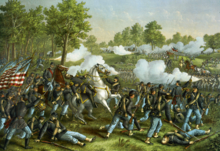Troop engagements of the American Civil War, 1861
There had been no casualties during the bombardment; but the following day while the Union garrison commander, Major Robert Anderson, was firing a fifty-gun salute, there was an explosion that resulted in one man being killed and five wounded.
Although these fights involved only a few hundred men on either side, the newspaper coverage of the campaign turned McClellan into a national hero.
Beauregard; although initially successful, Confederate reinforcements from the Shenandoah Valley routed McDowell and forced him back to Washington, D.C.[4] McDowell was replaced by McClellan, who renamed his force the Army of the Potomac and spent the rest of the year training his men and stockpiling supplies, despite pressure from the Union government to launch an offensive as soon as possible.
There were several minor skirmishes in Virginia during the remainder of the year, the most significant being the Battle of Ball's Bluff, due to the death of Colonel Edward Baker, a senator from Oregon.
McCulloch returned to Arkansas, while Price moved north, attempting to recapture the state from Union forces.

